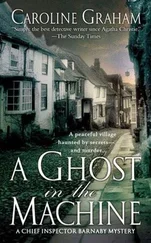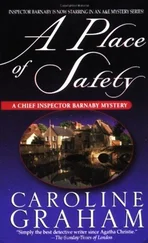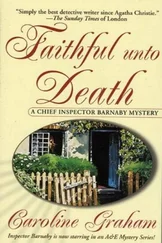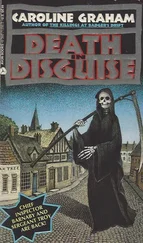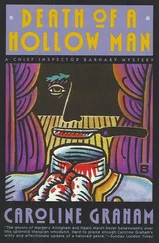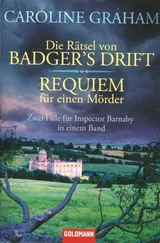A beam of dust-filled sunlight ambered the sheaf of lilies. Everyone rose to sing ‘The Day Thou Gavest Lord is Ended’. Behind Barnaby a dark branch of yew, activated by a sudden flurry of wind, knocked on the glass.
On the afternoon the inquest was reconvened the coroner’s court was packed. Every light-oak-stained folding seat was taken. Badger’s Drift seemed to have turned out in its entirety. It appeared (Barnaby scanned the rows of faces) that only David Whiteley and Michael Lacey had not turned up. The jury - striving to look serious, disinterested and worthy of the trust placed - were in position.
Barbara Lessiter was incongruously dressed in a black and white spotted frilled dress more suitable for a garden party, a little black hat with a frou-frou of spotted veiling concealing her face. Judy wore a fair-isle jumper and tweed trousers, Katherine Lacey a culotte suit in white linen. Her hair was held back by two scarves, brilliant turquoise and acid yellow, twisted around each other in a tight circlet. Mrs Rainbird had gone the whole hog and was wrapped, like some gargantuan Christmas gift, in shiny crimson satin topped off with a green hat covered in little berries. The coroner took his seat and the inquest began.
The statement of Doctor Trevor Lessiter was read out. In it he made the point most strongly that, on examining the deceased, he certainly had noticed congestion of the lungs, but as he was treating Miss Simpson at the time for bronchitis he thought the fact hardly surprising. Naturally he had not checked for symptoms of coniine poisoning. What physician in those circumstances would? The coroner said there was no blame to be apportioned in this matter and the doctor stared hard at the reporter from the Causton Echo to make sure he’d got that down. He then signed his statement and walked importantly back to his seat, his round head and pudgy shoulders looking pompous even from behind.
The pathologist’s report was read. There was a buzz of interest at the word hemlock and the Rainbirds held hands excitedly. Next a scientist from the Police Forensic Laboratory gave evidence relating to the analysis of fibres found in an area of beechwood near the village Badger’s Drift, and the identification of dirt and leaf mould adhering to tennis shoes belonging to the deceased as coming from the same area.
Two scene-of-crime officers described the large flattened space near which a deep impression of the same shoes indicated that Emily Simpson had been standing for some time. Here Barnaby noticed Miss Bellringer flush with anger and glare at the man giving evidence. He continued to describe an impression that could have been made by someone of Emily Simpson’s height and weight having fallen a few feet away. The coroner asked for a pause whilst he checked back on Doctor Lessiter’s statement. He then asked the doctor if the bruises on Miss Simpson’s shin could have been caused by the earlier fall. The doctor sighed mightily and, in a voice indicating that they had already wasted enough of his valuable time, said that he supposed so.
Scene-of-crime continued. Fingerprint details. The marked passage in the volume of Shakespeare, a 6B pencil which had not been found. The afternoon wore on. The postman was called, as was Miss Lucy Bellringer. She assured the court that on the morning of her friend’s death the larder window was undamaged and the hemlock not in the house. And that, as regards the 6B pencil, Miss Simpson would never have defaced her beloved Shakespeare. ‘She never put a mark in any of her books. They were far too precious to her.’
Detective Chief Inspector Barnaby described Miss Bellringer’s first visit and his meeting with Terry Bazely at which there was an even stronger buzz of interest. He glanced around the court as he mentioned Annabella but saw only a few puzzled looks. No flicker of recognition. As he sat down he glanced at the jury. Their seriousness now was not assumed. They were totally engrossed, looking intently at the coroner. One woman had gone very white. An usher crossed to her and murmured something but she shook her head, edging further forward in her seat.
The coroner started his summing up, concluding with directions to the jury which were unmistakable. They conferred together only for a moment before giving their verdict, which was that Emily Simpson had been murdered by a person or persons unknown.
Immediately the reporter from the Echo , perhaps influenced by too much film noir , flung on his brand-new white trench coat, pushed back an invisible eye shield and raced from the courtroom. Everyone else left more slowly - talking, questioning, looking at each other with a mixture of excitement and dismay like a bunch of critics at a prestigious first night whose worst hopes have just been confirmed.
Barnaby watched Barbara Lessiter leave on the arm of her husband. She had sat, apparently placid, through the whole proceedings, but he had noticed her hands moving. He walked now to the end of the row which held her seat and looked along the floor. Just in front of her chair was a little pyramid of shredded tissues. He remembered the letter which she had so quickly thrust out of sight the other morning, and regretted the veil. He would have liked to have seen the expression on her face when the verdict had been announced.
Almost everyone had now gone. But on a bench, some distance away, a solitary figure sat bowed, head low. He crossed the space and sat down.
‘Miss Bellringer ... ?’ She looked at him. Her skin was ashen, her fine eyes dull. ‘Are you all right?’ When she did not reply he said quietly, ‘Surely you understood where our investigations were leading?’
‘Of course ... that is ... I suppose I did.’ Her ebullience was quite gone. She looked very old. ‘But I hadn’t put it into words to myself. Why is it so much worse now that it’s been put into words?’ She looked at him inquiringly as if he would know. There was a long pause.
Barnaby said, ‘I’m sorry.’
‘Such wickedness.’ A flash of anger raked her face and left a spark in her eyes. ‘After a lifetime of caring for other people. She was a wonderful teacher, you know. Better than I’ve ever been. And of course she knew them, whoever it was. That’s the terrible thing. She must have welcomed them in.’ Silently Barnaby agreed. ‘Well, they must be caught,’ she continued, her voice strengthening by the minute. ‘Right - what are your instructions, Chief Inspector? What shall I do next?’
‘Nothing, I’m afraid. We—’
‘Oh but I must do something. I can talk to people, can’t I? Find out if anyone noticed anything, anything at all on the day she died. And what about this mysterious Annabella? Perhaps I can discover who she is.’
‘I’m sorry, Miss Bellringer—’
‘But I’ve got to help. Surely, Chief Inspector, you can see why?’
‘Of course I understand your—’
‘Poirot,’ she interrupted wistfully, ‘had his Hastings, you know.’
‘And I, Miss Bellringer, have all the resources of a modern police force at my disposal. It’s a different world.’
‘They can’t be everywhere at once. And in any case I’m sure’ - she laid a gloved hand on his arm - ‘they can’t all be as intelligent as you.’
‘Please be sensible,’ said Barnaby, resisting as well as he could such blatant flattery. ‘I’m sure your friend would not wish to put your life at risk.’
She removed her hand. ‘What on earth do you mean?’
‘In a community as small as Badger’s Drift everyone will know what you’re about. Someone who has killed once and who thinks he can protect himself by killing a second time will not hesitate to do so. And don’t forget’ - he turned and they walked together towards the exit - ‘that if Miss Simpson knew the murderer very well, so do you.’
Читать дальше

